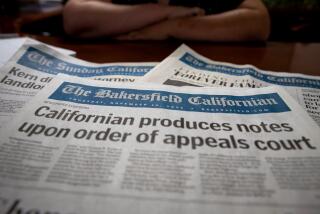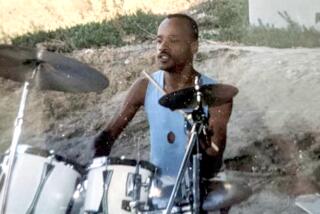Newspaper Defies Court, Prints Story on Testimony
SAN BERNARDINO — The San Bernardino Sun newspaper defied a court order Friday by publishing a story about testimony in a death penalty case that defense attorneys said would endanger the defendant if he returns to prison.
“We took that action this morning because we believe our readers should be aware of what is happening in this courtroom,” said Robert W. Ritter, executive editor of the San Bernardino Sun. “We believe that we have the right under the First Amendment.”
Ritter said he believes that the paper violated an order issued Thursday by San Bernardino Superior Court Judge Bob N. Krug, who is presiding over a retrial of the death penalty phase of the case of Danny Guerra. Krug declined comment Friday, a bailiff said.
Guerra, a former security guard, was convicted of the 1980 murder of a fellow guard and the wounding of his partner.
Death Sentence Overturned
When the California Supreme Court reviewed the case in 1985, the justices upheld the first-degree murder conviction but overturned the death sentence on grounds the prosecution did not prove Guerra intended to kill.
Defense attorney Gary Smeltzer sought Wednesday to have the public and media excluded from court during testimony by a psychologist who had interviewed Guerra. Krug issued an order barring attorneys from discussing arguments on the reasons for Smeltzer’s fears that publication of the testimony would put Guerra in danger.
But in an on-the-record bench conference, Smeltzer said: “The Sun would . . . send Mr. Guerra back to San Quentin (prison) wearing a snitch jacket” if the testimony were published.
Krug cleared the court Thursday for testimony by psychologist Michael Girodo, but allowed a Sun reporter to remain, warning that he might issue a gag order at some point. After about two hours of testimony, Sun attorney James Manning asked for clarification on whether the paper could publish.
Publishing Ban
Krug responded by issuing an order barring the paper from publishing anything the reporter had heard in court.
“I have the responsibility to make the best order I can,” Krug said. The judge said he would have to hear all the psychologist’s testimony before making a final decision on whether it might endanger Guerra’s life if published.
The paper reported that Girodo testified that he had been told that Guerra served in the Army and for a time was a guard at a nuclear missile site in West Germany and had done undercover intelligence work.
Girodo, a clinical psychologist at the University of Ottawa and a consultant to the Royal Canadian Mounted Police, said he has found that undercover work can distort the personalities of law enforcement officers who aren’t properly “debriefed,” the Sun reported.
He said that in interviewing Guerra in the County Jail, he had found signs of paranoia and “extreme distrust of those around him.”
Alleged Demonstration
In his opening arguments, Smeltzer said he would show that Guerra was appalled by poor security outside the Fedco department store where the victims worked. He said Guerra disarmed and kidnaped the guards to prove a point, and purposely aimed his first shot away from the other guards. He said the second, fatal shot, went off by accident.
Judges have fined, and in some cases jailed, news reporters who defied court orders. But penalties often are delayed pending appeal.
“We have discussed what the consequences of publishing might be,” Ritter said.
He appeared in court Thursday for testimony establishing that he would be the one to decide if the paper published in defiance of the order.
“We feel that if some penalty is assessed, that it is in violation of the Constitution,” Ritter said.
Newspaper attorney Manning said he believed that the order was directed specifically at the Sun and did not apply to republication of the story.
More to Read
Sign up for Essential California
The most important California stories and recommendations in your inbox every morning.
You may occasionally receive promotional content from the Los Angeles Times.










